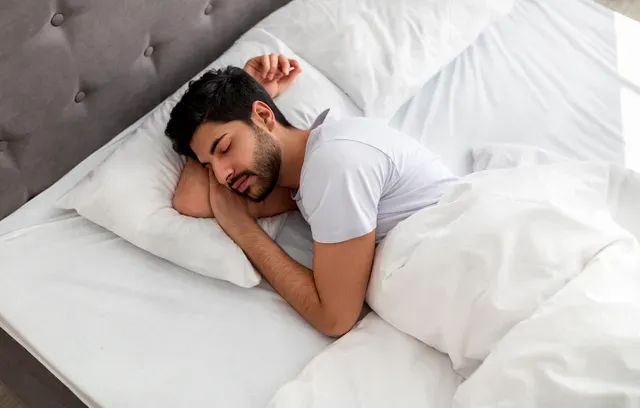Sleep Health and Wellness
Maintaining sleep health is imperative for overall well-being. The lack of it can lead to various physical, mental, and emotional issues, including high blood pressure, anxiety, and memory loss. At Nirvana Healthcare Management Services, our team of providers are committed to enhancing health and wellness, utilizing a proactive strategy in diagnosing and treating patients in Essex County, New Jersey, who are dealing with a range of sleep disorders.
While many people emphasize the quantity of sleep, the quality of sleep holds more importance. Sleep disorders such as sleep apnea disrupt the breathing process during rest, causing it to cease and recommence intermittently throughout the night. This irregularity hinders the body from obtaining sufficient oxygen, thereby diminishing the quality of sleep.
The National Institutes of Health recognizes two primary forms of sleep apnea: obstructive sleep apnea and central sleep apnea. Other sleep disorders include restless legs syndrome, which can also impact the ability to fall asleep and maintain quality sleep. By adhering to good sleep hygiene practices, individuals can improve their sleep health and manage sleep disorders more effectively.
Central Sleep Apnea
Central sleep apnea is when the brain fails to transmit the correct signals to control breathing during the sleep-wake cycle. This disorder is generally triggered by existing health conditions that affect the brain’s management of the airway and chest muscles.
Obstructive Sleep Apnea
A more common sleep disorder is obstructive sleep apnea. Obstructive sleep apnea occurs when the muscles in the throat fail to keep the airway open during sleep, causing breathing to stop and start repeatedly. This can lead to poor sleep quality, daytime fatigue, and other health problems. Treatment options include lifestyle changes, such as weight loss and avoiding alcohol and sedatives, as well as using breathing devices or surgery in more severe cases.
Symptoms of Sleep Apnea
Diagnosing sleep apnea can pose a challenge as the individual suffering from it frequently doesn’t recognize the symptoms. However, it’s often the sleeping partner who first identifies the signs. Some of the identifiable symptoms of sleep apnea that a partner might notice include:
- Irregular breathing (pauses and restarts)
- Struggling for air
- Consistent and loud snoring
Sleep apnea doesn’t just disturb people during their sleep; it also carries over into their waking hours. During the day, individuals may show the following symptoms that hint at this sleep disorder:
- Reduced sexual desire or sexual problems
- A dry mouth
- Headaches
- Feeling fatigued
- Difficulty concentrating and remembering things
- Getting up frequently during the night to urinate
Sleep apnea significantly affects cardiovascular health and overall wellness. Reduced oxygen levels can heighten the risk of experiencing an irregular heartbeat, also known as cardiac arrhythmia, and can make managing blood pressure more complex.
Sleep Apnea Diagnosis
At Nirvana Healthcare Management Services, we collaborate with an assorted group of pulmonary and sleep specialists. Our expertise is in employing the sleep study method to identify sleep disorders like sleep apnea. During this process, we request patients to use a recording instrument, such as a smartphone, to gain insights into their sleep patterns. This device, positioned beside the bed, records throughout the night, and the recordings are studied the following morning. Any audible signs of snoring, gasping, or choking could affirm the diagnosis of sleep apnea.
Treating Sleep Apnea
When a patient exhibits risk factors for sleep apnea, our specialists may recommend lifestyle modifications to prevent the disorder’s progression. These suggestions might include weight loss, regular exercise, cessation of smoking, or cutting down on alcohol consumption. Once a patient is diagnosed with sleep apnea, a prevalent treatment approach is the use of the CPAP oxygen machine. This device provides continuous positive airway pressure to the throat, ensuring the airway remains open during sleep. Alternative breathing devices, such as auto-adjusting positive airway pressure (APAP) and bi-level positive airway pressure (BPAP) machines, are also considered if the CPAP machine doesn’t yield the desired results.
In cases where a breathing device fails to alleviate symptoms, a healthcare provider might consider surgical interventions to treat sleep apnea. Most surgical procedures aim at expanding the airways, which can involve removing soft tissue from the mouth and throat or repositioning the upper and lower jaws. Another procedure includes inserting an implant that monitors breathing patterns and aids in controlling the muscles that open the airways during sleep. As sleep apnea can also occur due to enlarged tonsils, an adenotonsillectomy to remove the tonsils and adenoids might be recommended.
Maintaining sleep health and quality sleep is crucial for physical and mental health. Sleep hygiene plays a significant role in managing sleep disorders and improving sleep quality. Proper diagnosis and treatment of sleep disorders like obstructive sleep apnea and central sleep apnea are essential for overall health, as recommended by national institutes of health.
Insomnia
Insomnia is a prevalent sleep disorder characterized by difficulty falling asleep, staying asleep, or waking up too early with an inability to fall asleep again. This sleep disorder interferes with the sleep-wake cycle, leading to inadequate quality sleep. Consequently, you may experience excessive daytime sleepiness due to not getting enough sleep at night. Insomnia can significantly affect your mental health, energy levels, and overall quality of life, impacting your performance at work and other daily activities.
Diagnosing and Treating Insomnia
Diagnosing insomnia, one of the most common sleep disorders is a process that continues to evolve as researchers expand their understanding of this condition. It often involves an in-depth patient interview, and sleep diaries may also be used to track patterns and identify issues with falling asleep or staying asleep.
A sleep study may be recommended if the insomnia appears to be associated with breathing problems, such as sleep apnea or other sleep disorders. This study can provide valuable insights into the patient’s sleep-wake cycle and quality of sleep. In some cases, the initial diagnosis may be uncertain, and other sleep disorders like obstructive sleep apnea or restless legs syndrome may be present, necessitating further testing.
While diagnosing insomnia, it’s crucial to consider any underlying conditions or factors that could interfere with sleep. These may include medical or psychiatric disorders, certain medications, or poor sleep habits. Chronic insomnia, in particular, requires careful evaluation and diagnosis by a sleep doctor.
Treatment generally focuses on improving sleep hygiene and addressing any underlying issues that may be contributing to insomnia. Prescription medications may be used in some cases, but they are generally not recommended as a long-term solution due to potential side effects and the risk of dependency.
Other Sleep Disorders
- Narcolepsy: A neurological disorder that affects the control of sleep and wakefulness, leading to excessive daytime sleepiness and sudden attacks of sleep.
- Restless Legs Syndrome (RLS): A neurological disorder characterized by a strong urge to move one’s legs during periods of rest or inactivity.
- Periodic Limb Movement Disorder (PLMD): A condition where a person moves limbs involuntarily during sleep, leading to disrupted sleep.
- Circadian Rhythm Sleep Disorders: These disorders occur when your internal body clock is out of sync with external cues for sleep, leading to sleep disturbances.
- Parasomnias: This includes a number of unusual behaviors during sleep, like sleepwalking, night terrors, and sleep eating.
- REM Sleep Behavior Disorder: A condition in which people act out vivid dreams during REM sleep.
- Hypersomnia: Characterized by excessive sleepiness during the day or prolonged bouts of sleep at night.
- Sleep Paralysis: A temporary inability to move or speak while falling asleep or upon waking.
- Nightmares and Night Terrors: Recurrent nightmares can disrupt sleep, as can night terrors, which cause feelings of fear or terror upon awakening.
- Sleep-Related Eating Disorder: Unconscious eating while asleep.
- Shift Work Sleep Disorder: Difficulty sleeping due to working non-traditional hours.
- Jet Lag Disorder: Temporary sleep problems that can affect those who travel quickly across multiple time zones.
It’s important to note that while these conditions can disrupt normal sleep patterns and reduce sleep quality, most of them are treatable once properly diagnosed. If you suspect you have a sleep disorder, it’s recommended to speak with a healthcare provider.
Find a Sleep Specialist in Essex County, NJ
Transforming patient care for over 50 years, Nirvana Healthcare Management Services is dedicated to enhancing the overall experience for individuals by providing seamless primary and preventative care. With multiple locations in Newark and East Orange, NJ, including renowned medical groups like Salerno Medical Associates and Metropolitan Medical Group, we strive for a standardization of care. Our team also offers in-home visits for eligible patients through CHOP. If you want to learn more about effective treatment for sleep apnea and other sleep disorders, contact our office today. Experience the difference.

